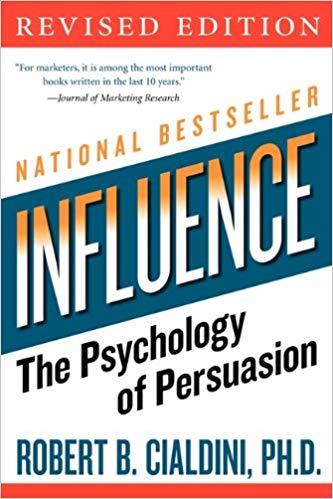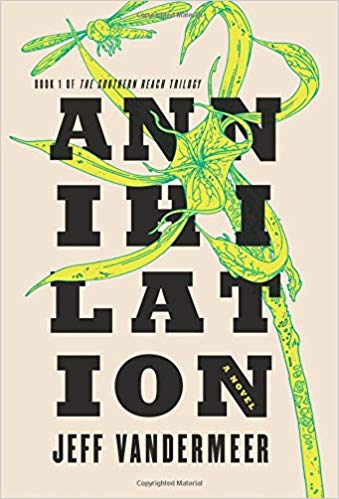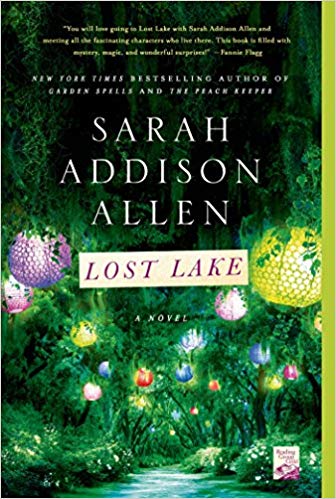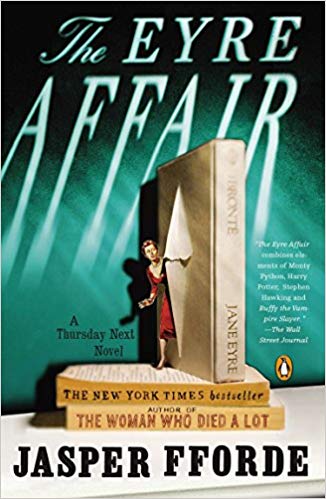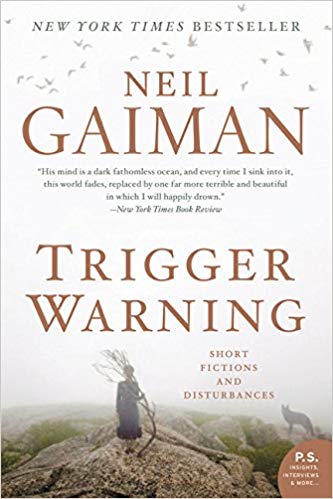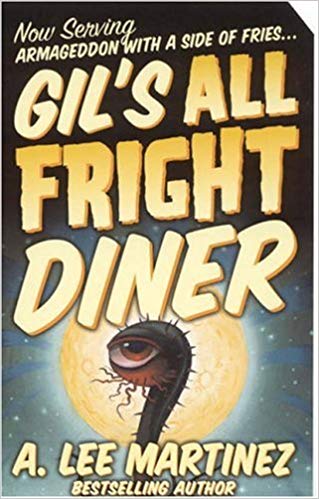
July 2019’s Reads
I recently changed up my schedule so that I'd have more time to read. Because I figured y'all weren't content with the four to eight books or so that I detail here each month.
Ok, honestly, I just enjoy reading, though it is necessary to my job, i.e. being a writer. Reading fiction is a pleasurable activity, but it's also market research in a lot of ways. Which is probably more than you wanted to know.
Over the past few years, as I've delved into marketing and advertising for my stories, I would find references to core books in the field, like Influence: The Psychology of Persuasion by Robert B. Cialdini. In my mind, it's much better to read the core books than to read someone else's perspective on it, so as soon as I could, I picked up a copy of Influence and stashed it on my to be read shelf for business non-fiction.
Yes, I have a separate shelf for business non-fiction. And that's exactly where Influence stayed until a few weeks ago when I decided that I really needed to up my game.
Let's just say that the publishing industry is highly competitive, much more so than readers believe, and leave it at that.
Anyway, as soon as I started reading Influence, I knew I was in for a treat. For one thing, there are footnotes. Footnotes, people! So I knew Cialdini cared enough about his subject matter to provide references. But he is a psychologist and this is his field of study, so I should've expected nothing less.
But it's the insight he provides into how and why persuasion works that really got me. I understood from the get-go why so many marketers based their tactics on his book; marketing is an act of selling and it requires a great deal of persuasion and influence to be a successful salesperson.
I finally, at long last, got to read about the whys of the tactics other book marketers recommended.
I'm listing Influence here instead of at the end of this post, with my other books-for-authors books, because every single person needs to read this book in order to protect themselves against scammers. Because for every honest salesperson out there (like me!), there's at least one more who's going to use persuasion tactics in a negative way that could be harmful to the average buyer.
So the information in Influence works both ways. It helps people like me, honest purveyors of goods, to ethically use psychology to connect to readers, and at the same time, it allows people like you, honest buyers of goods, to avoid being scammed. I highly, absolutely, beyond a doubt recommend Influence to everyone, across the board.
I've been meaning to read a Jeff VanderMeer novel for a while now, mostly becuase he and his wife Ann compiled a massive volume of Weird fiction. When I saw VanderMeer's novel Annihilation at the library, I decided to give it a go.
Annihilation is told from the perspective of a biologist whose name we never learn. The biologist is part of a four-woman expedition into Area X, a section of wilderness in the Southern Reach that we eventually discover is very different and apart from "normal" Earth.
The biologist is a loner and doesn't particularly get along with her teammates, but she doesn't not particularly get along with them either. Her narration is divided primarily between the ongoing mission and remembrances of the things that led her to that point in time, particularly her husband and things pertaining to her career.
VanderMeer tries to use the story as a metaphor for colonialism, but in reality, Annihilation is more the story of the biologist and the relationship she had with her husband than anything. It's an odd duck of a tale (read: really weird), but it can also be quite fascinating, if you can get past VanderMeer's clumsy attempts to insert a deeper message into the story. Much like inserting a square peg into a round hole, the message just didn't fit well here. Ah, well. He tries again in two subsequent books, but reviewers really hated the second one, so I'll stick to my enjoyment of Annihilation and try a different one of his stories later on.
I keep promising I'll lay off the Sarah Addison Allen books. Despite my good intentions to read something else, I just keep coming back to her.
Lost Lake is, like Allen's other books, a lovely blend of Magical Realism and Southern charm. It's set in south Georgia during the summer, a setting Allen perfectly captures in her languid and vivid language.
Kate's husband died one year ago, sending her into a depression so deep, she feels as if she's waking up when she finally pulls out of it. Upon discovering a Lost Lake postcard from her great aunt Eby, Kate packs her daughter Devin up and they drive down for a good visit.
Lost Lake holds secrets though, treasures from the one summer Kate spent there in her youth, Eby's longing to hang onto the rundown summer resort, a ghost Eby's closest friend can't let go of, and an alligator only Devin can see.
Lost Lake isn't the most seamlessly woven tale, but it's a fun, heart-warming read full of the flavors of summer vacation and family both lost and found.
A long time ago in a library far, far away, I discovered the Thursday Next books by Jasper Fforde. After reading Fforde's Shades of Grey in June, I needed a little more of Fforde's particular brand of weird, so naturally I turned to The Eyre Affair.
Thursday Next is a LiteraTec officer, the police in charge of investigating crimes of the literary nature. Books are revered by society, to the point of mania, and travel into a book is possible, though rare. The world building is phenomenal. Fforde has created an alternate reality in which the UK isn't a thing, Wales is still an independent nation, the Crimean War is ongoing, and nearly everyone owns a clone of an extinct animal (of one sort or another) as a pet.
In The Eyre Affair, Thursday faces down archvillain Acheron Hades and a machine that allows him to slip into books and steal characters, thus disrupting their story lines to the dismay of dedicated readers. Fforde slips in so many literary references, it's impossible to name them all, but one amusing subplot focuses on the debate around who really wrote Shakespeare's plays. You'll learn more about the very real controversy than you ever wanted to know.
The Eyre Affair is a fun-filled, action-packed, surprisingly intelligent read. Be prepared to settle in with this one, as you won't want to put it down.
Gil's All Fright Diner by A. Lee Martinez is a campy mix of Contemporary Fantasy and Apocalyptic fiction, with a little Lovecraft thrown in for good measure.
During a drive through Rockwood County, Duke (a werewolf) and Earl (a vampire) stop at a diner for a bite and end up taking a temporary job digging a gas line for the diner's owner. One thing leads to another, and before they know it, Duke and Earl are fighting zombies, flirting with women of all shapes, ages, and stages of life (and death), and trying to stop the end of the world.
Gil's All Fright Diner is not the most smoothly written story, and if you're looking for deep, meaningful fiction, you're not going to find it here. But it is a fun, action-packed read of the weird variety, so there's that.
I love Neil Gaiman. That's not a secret at all, and in my recent mad rush to inject a little darker fiction into my reading, I landed on his collection of short stories as a good place to start.
Trigger Warning: Short Fictions and Disturbances contains about two dozen short stories and poems written in Gaiman's straight-forward, imagination bending style. Gaiman's introduction alone is well worth the read, and often as entertaining as the stories they describe.
My favorite stories were "The Thing about Cassandra," in which a young man is confronted by his imaginary teenage girlfriend; "Click-Clack the Rattlebag," which was possibly the spookiest tale in the collection; "Nothing O'clock," a Doctor Who tale; "In Relig Odhrain," about two men and their quest for treasure, though what the treasure is and is not will surprise you; and "Black Dog," set after the End of American Gods, featuring that story's protagonist, Shadow.
My other non-fiction began with Goals!: How to Get Everything You Want--Faster than You Ever Thought Possible by Brian Tracy. I have been struggling to finish some stories so that I can move in a new direction with my writing. One day, while researching business books, I stumbled across this one. By chance, it was in my local library, and am I ever thankful it was. Goals! helped me figure out exactly what I'm trying to accomplish with a series of practical exercises embedded within the equally practical advice. If you're struggling to find a direction and want to actually accomplish some of your goals and dreams, this is an excellent place to start.
Finally, I re-read Deep Work: Rules for Focused Success in a Distracted World by Cal Newport. Deep work is the state of undistracted focus needed for many information workers and creatives, like writers. Without the ability to focus for long periods of time, minus interruptions from the outside world, writing long fiction is nearly impossible. (I know some people who manage it, but they have limited chunks of time and have to make do.) I re-read Deep Work specifically as a reminder of why I need to cut down on distractions (like social media) and reinforce my writing process/system in order to fulfill my goals.
That's it for July's reads!
